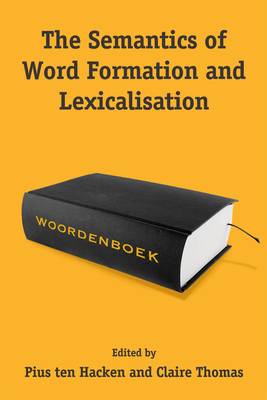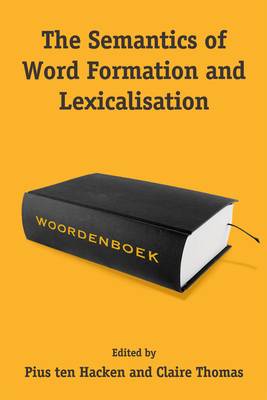
- Retrait gratuit dans votre magasin Club
- 7.000.000 titres dans notre catalogue
- Payer en toute sécurité
- Toujours un magasin près de chez vous
- Retrait gratuit dans votre magasin Club
- 7.000.0000 titres dans notre catalogue
- Payer en toute sécurité
- Toujours un magasin près de chez vous
The Semantics of Word Formation and Lexicalization
Pius Ten Hacken, Claire ThomasDescription
In the study of word formation, the focus has often been on generating the form. In this book, the semantic aspect of the formation of new words is central. It is viewed from the perspectives of word formation rules and of lexicalization.
Each chapter concentrates on a specific question about a theoretical concept or a word formation process in a particular language and adopts a theoretical framework that is appropriate to the study of this question. From general theoretical concepts of productivity and lexicalization, the focus moves to terminology, compounding, and derivation. The theoretical frameworks that are used include Jackendoff's Conceptual Structure, Langacker's Cognitive Grammar, Lieber's lexical semantic approach to word formation, Pustejovsky's Generative Lexicon, Beard's Lexeme-Morpheme-Base Morphology, and the onomasiological approach to terminology and word formation. An extensive introduction gives a historical overview of the study of the semantics of word formation and lexicalization, explaining how the different theoretical frameworks used in the contributions relate to each other.
Spécifications
Parties prenantes
- Auteur(s) :
- Editeur:
Contenu
- Nombre de pages :
- 272
- Langue:
- Anglais
Caractéristiques
- EAN:
- 9780748689606
- Date de parution :
- 17-11-13
- Format:
- Livre relié
- Format numérique:
- Genaaid
- Dimensions :
- 155 mm x 236 mm
- Poids :
- 703 g

Les avis
Nous publions uniquement les avis qui respectent les conditions requises. Consultez nos conditions pour les avis.






